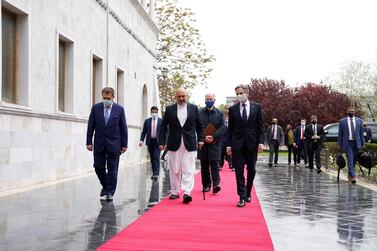Former Manchester United and Ireland captain Roy Keane warned after Sunday's fan protests against the owners of the football club, the Glazer family, that this was "just the start" of their campaign.
Over the weekend, these weren't the only protests happening, nor were they just related to football. There were rallies in Colombia, France, Spain, the UK and Germany – some of these were timed for May Day or Labour Day. Taken together with previous protests, going back at least to last summer's Black Lives Matter rallies, it shows that people are more ready than ever to take to the streets to call for change when they believe that their interests have been undermined.
The experience at Manchester United is also a good illustration of how we have arrived at this point when demonstrations have become more frequent. Keane explained that the trigger for what happened in Manchester on Sunday was a long time coming.
It wasn't only about recent weeks and the plans by Europe's biggest football clubs to form a breakaway European competition. "It's been building for a number of years. They've come to the end and feel enough is enough … There's been a build-up in tension."
In any case, the fans got the immediate result they wanted – the match was postponed.
In Colombia, protesters also got what they wanted. President Ivan Duque said he will withdraw a proposed tax reform that included changes to sales tax on utilities and some food. However, protests did continue for several more days – there has been discontent simmering for some time in that country.
The same could be said elsewhere in the world.
More than a year ago, before the pandemic hit, the Edelman Trust Barometer showed that "a majority of respondents in every developed market do not believe they will be better off in five years' time, and more than half of respondents globally believe that capitalism in its current form is now doing more harm than good in the world".
“Distrust is being driven by a growing sense of inequity and unfairness in the system. The perception is that institutions increasingly serve the interests of the few over everyone,” it added.
This is the backdrop for the societal unrest we are facing in 2021 and there should be an expectation that it will continue. The impact of the pandemic and Covid-19-related restrictions have come on top of technological shifts, economic headwinds and intensifying climate change, applying increasing pressure on governments and populaces alike.

In such a charged atmosphere, when so many are stretched close to breaking point, decision makers must be cautious to avoid attempts to push through policies that have little benefit to the majority of stakeholders. The now-aborted European Super League idea is proving the point.
Although long-term solutions to many of the most belligerent issues are coming, such as US President Joe Biden's proposed education, jobs and infrastructure programmes – which will see several trillions of dollars invested in creating a more sustainable and equitable future should they win backing from Congress – more immediately, there can be no quick panacea.
Street demonstrations are just the tip of the iceberg, as social media reveals the scale of action by activists trying to persuade Manchester United's commercial partners to lend weight to their attempts to force the owners to sell up. There have been other, if smaller, protests at Arsenal and Tottenham Hotspur, part of the group of six English clubs that tried to break away.
Football fans clearly do not believe the current system favours them. They want more of a say in the running of the clubs and the game. Whether they are able to achieve real change remains to be seen. Sunday’s invasion of Old Trafford by Manchester United fans was followed by clashes between police and supporters outside the stadium.

Activists have promised more to come at the next home match, raising the prospect of further ugly scenes.
It will be difficult for authorities to quell this tide without making sure some of their demands are met. This will be tricky for the British government, which has backed fans opposing the European Super League.
However, the experience of the pandemic has changed the paradigm, and authorities cannot ignore people who have largely accepted the restrictions put in place because of the public health crisis on the basis of putting the common good above the individual. Extending that progressive thinking to fix other problems in society doesn’t seem that far-fetched now.
Beyond football, will this apply to those tackling wider systemic problems, such as those pushing for an end to racial inequalities and prejudice, calling for action against climate change or fairer distribution of Covid-19 vaccines?
At this inflection point, they do seem to have significant momentum behind them and some kind of change seems inevitable.
Mustafa Alrawi is an assistant editor-in-chief at The National






